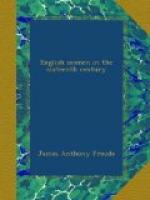The sixty ships which had followed the San Martin succeeded at last in getting round Cape Clear, but in a condition scarcely less miserable than that of their companions who had perished in Ireland. Half their companies died—died of untended wounds, hunger, thirst, and famine fever. The survivors were moving skeletons, more shadows and ghosts than living men, with scarce strength left them to draw a rope or handle a tiller. In some ships there was no water for fourteen days. The weather in the lower latitudes lost part of its violence, or not one of them would have seen Spain again. As it was they drifted on outside Scilly and into the Bay of Biscay, and in the second week in September they dropped in one by one. Recalde, with better success than the rest, made Corunna. The Duke, not knowing where he was, found himself in sight of Corunna also. The crew of the San Martin were prostrate, and could not work her in. They signalled for help, but none came, and they dropped away to leeward to Bilbao. Oquendo had fallen off still farther to Santander, and the rest of the sixty arrived in the following days at one or other of the Biscay ports. On board them, of the thirty thousand who had left those shores but two months before in high hope and passionate enthusiasm, nine thousand only came back alive—if alive they could be called. It is touching to read in a letter from Bilbao of their joy at warm Spanish sun, the sight of the grapes on the white walls, and the taste of fresh home bread and water again. But it came too late to save them, and those whose bodies might have rallied died of broken hearts and disappointed dreams. Santa Cruz’s old companions could not survive the ruin of the Spanish navy. Recalde died two days after he landed at Bilbao. Santander was Oquendo’s home. He had a wife and children there, but he refused to see them, turned his face to the wall, and died too. The common seamen and soldiers were too weak to help themselves. They had to be left on board the poisoned ships till hospitals could be prepared to take them in. The authorities of Church and State did all that men could do; but the case was past help, and before September was out all but a few hundred needed no further care.
Philip, it must be said for him, spared nothing to relieve the misery. The widows and orphans were pensioned by the State. The stroke which had fallen was received with a dignified submission to the inscrutable purposes of Heaven. Diego Florez escaped with a brief punishment at Burgos. None else were punished for faults which lay chiefly in the King’s own presumption in imagining himself the instrument of Providence.
The Duke thought himself more sinned against than sinning. He did not die, like Recalde or Oquendo, seeing no occasion for it. He flung down his command and retired to his palace at San Lucan; and so far was Philip from resenting the loss of the Armada on its commander, that he continued him in his governorship of Cadiz, where Essex found him seven years later, and where he ran from Essex as he had run from Drake.




